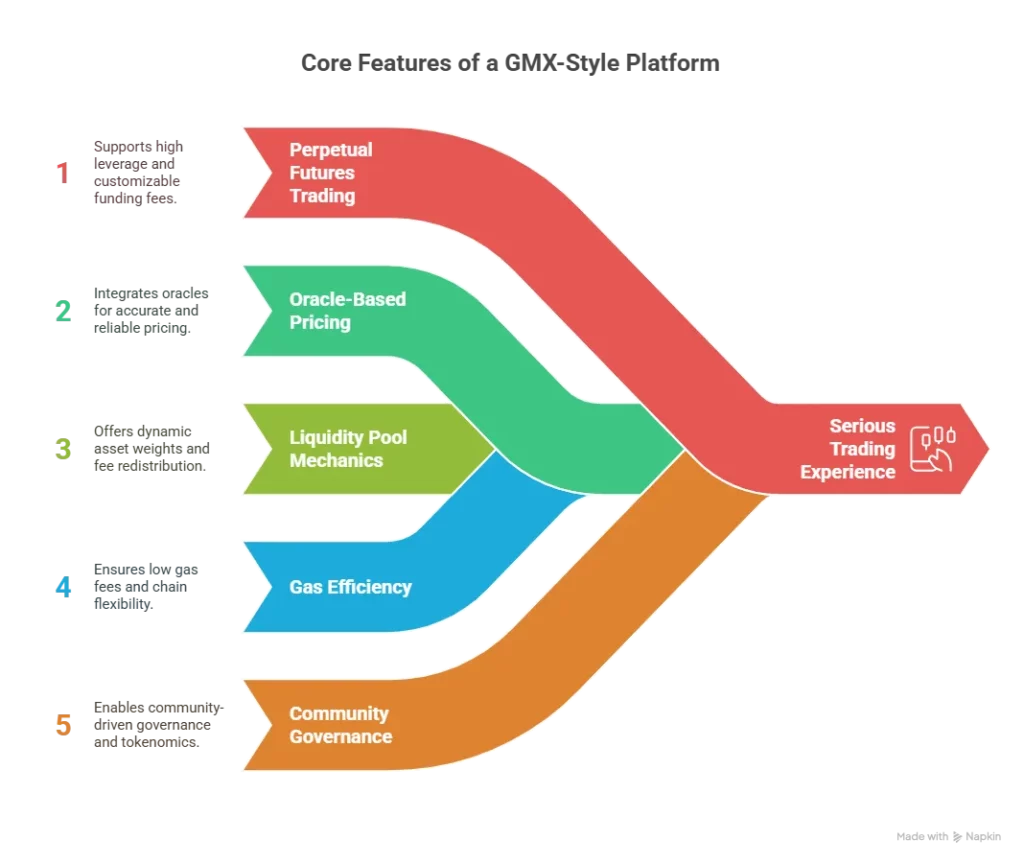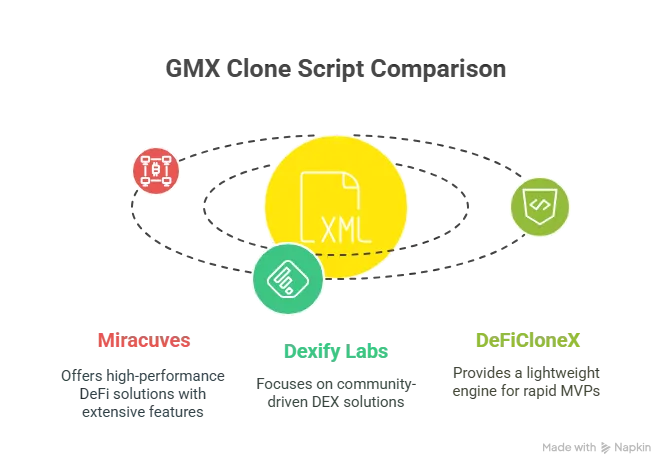Back in the early DeFi days, launching your own exchange meant wrestling with liquidity pools, smart contract audits, and constant front-end failures. And then came GMX — a decentralized perpetual exchange that didn’t just work, it worked beautifully. Low fees, high leverage, no sign-ups. The kind of no-nonsense crypto tool that developers and traders both fell in love with.
If you’re looking to build your own decentralized trading platform, chances are you’ve studied GMX closely — maybe even used it religiously. But building a similar product from scratch? That’s months (or years) of work. Fortunately, 2025 is the golden age of clone scripts — especially in crypto.
Whether you’re launching a community-focused DEX, a derivatives trading hub, or a DAO tool, this guide will help you choose the best GMX clone scripts available today. From features to pricing, we’ll compare it all — and show you how Miracuves helps builders like you launch faster without compromising performance or decentralization.
Why a GMX Clone is a Smart Move in 2025
Let’s get something out of the way — this isn’t about copy-pasting code. It’s about capturing GMX’s proven user experience and liquidity model and applying it to your niche, your audience, your chain.
GMX broke ground by offering:
- On-chain perpetual futures
- Zero price impact trades
- Dynamic pricing via Chainlink + TWAP
- Community-owned liquidity (GLP)
It operates on Arbitrum and Avalanche, supports leverage up to 50x, and has one of the cleanest interfaces in DeFi. According to DeFiLlama, GMX consistently ranks among the top 10 protocols by TVL, with over $500M locked.
Cloning that model for your own ecosystem — whether you’re on BNB Chain, Polygon, or a custom rollup — opens doors to:
- Institutional-grade DeFi tools for local communities
- DAO-run trading protocols
- Niche trading assets (e.g., commodities, tokens, NFTs)
- Platform-native tokens with real yield
Core Features Every GMX Clone Script Should Offer

A real GMX-style platform goes far beyond token swaps. These are the key features your clone must include to deliver a serious trading experience:
1. Perpetual Futures Trading
The heart of GMX is perpetuals. Your clone script should support:
- Leverage up to 50x
- Long & short positions
- Customizable funding fees
- Liquidation mechanisms
2. Oracle-Based Pricing
GMX uses Chainlink + time-weighted average price (TWAP). Your clone should offer:
- Oracle integrations (Chainlink, Band, Pyth)
- Fallback price feeds
- On-chain + off-chain hybrid models
3. Liquidity Pool Mechanics
GMX’s GLP (GMX Liquidity Pool) is brilliant. Look for:
- Single asset or basket LP support
- Dynamic asset weights
- Fee redistribution to LP holders
- Rebalancing tools
4. Gas Efficiency + Chain Flexibility
No one likes high gas. A good clone should support:
- L2 deployment (Arbitrum, Optimism)
- EVM compatibility
- Token bridges or rollup integrations
5. Community Governance & Tokenomics
If you’re launching a DEX without a token, you’re leaving money on the table. Your script should support:
- Dual token models (GMX/GLP style)
- Fee staking
- DAO governance voting
- Airdrop or LP incentives
Top GMX Clone Scripts in 2025 – Features & Pricing Compared

1. Miracuves – GMX Clone Script
Best for: Teams building high-performance, fully-custom DeFi exchanges
Key Features:
- Smart contract suite for perpetuals, vaults, and fee distribution
- EVM-ready deployment on Arbitrum, Avalanche, or custom chains
- Real-time price feed module (Chainlink + fallback)
- Liquidity engine with LP share tracking
- Token staking, governance, and vault analytics dashboard
Add-ons:
- Mobile-first trading UI
- DAO governance module
- Multi-chain bridge integration
Pricing: Starting at $1,499 one-time license
Enterprise: Quote-based with audit support
Why Choose: Miracuves balances DeFi-grade performance with startup-ready flexibility — plus ongoing support for tokenomics, incentives, and UI upgrades.
2. Dexify Labs
Best for: Web3 DAOs launching a community-owned DEX
Key Features:
- Simplified perpetual trading contract
- DAO treasury and fee vault setup
- Snapshot voting integration
Pricing: $899 license
Add-ons: $299 for tokenomics module
Why Choose: Community-focused, ideal for DAOs or ecosystem-based exchanges. Lacks deep analytics or advanced LP rebalancing.
3. DeFiCloneX
Best for: Rapid MVPs on testnets or hackathons
Key Features:
- Lightweight perpetual engine
- Basic front end with trading view
- Faucet-based demo tokens
Pricing: $99/month SaaS model
Why Choose: Great for proof-of-concept. Not intended for production or real capital deployment.
Choosing the Right Clone Based on Use Case
Here’s a simple breakdown to help match the script to your goals:
| Use Case | Recommended Script |
|---|---|
| Production-ready DEX on L2 | Miracuves |
| DAO-run trading platform | Dexify Labs |
| Hackathon MVP or demo | DeFiCloneX |
| Token + liquidity farming integration | Miracuves |
| Low-code, fast-launch solution | Dexify Labs |
Smart Contract Audits: Non-Negotiable in 2025
Let’s be real — launching a DEX without an audit is asking for trouble. Clone script or not, your platform handles real assets. Make sure your provider:
- Offers access to audited contracts
- Supports integrations with audit firms (CertiK, Hacken, SlowMist)
- Provides test coverage and stress test data
Conclusion
Building a GMX-style decentralized exchange isn’t just for the elite anymore. In 2025, the tools exist — clone scripts are powerful, flexible, and surprisingly affordable. The real win lies in customizing the platform to fit your niche, your tokenomics, and your vision.
Whether you’re targeting a local Web3 community, launching a DAO-run exchange, or just want to bring leverage trading to a new chain, your path forward starts with the right script — and the right partner.
At Miracuves, we help innovators launch high-performance app clones that are fast, scalable, and monetization-ready. Ready to turn your idea into reality? Let’s build together.
FAQs
Still have questions about GMX Clone Scripts in 2025? Let’s clear them up.
Is it legal to launch a GMX clone?
Yes, as long as you build your own smart contracts and avoid copying protected brand elements. Functionality isn’t trademarked.
Can I launch this on my own blockchain?
If your chain is EVM-compatible, yes. Scripts like Miracuves’ GMX clone support cross-chain deployment.
Do I need a token to launch?
Technically, no. But for community growth, staking, and governance, a token is strongly recommended.
How are liquidations handled?
Your clone should include logic for margin calls, funding rates, and automated liquidation based on real-time price oracles.
What’s the best chain to launch on?
Popular choices include Arbitrum, Base, and Optimism for low fees and high throughput. Polygon and BNB Chain are also viable.
Can I earn from LP fees?
Absolutely. Your protocol can distribute fees to liquidity providers, stakers, and your treasury via customizable split ratios.







